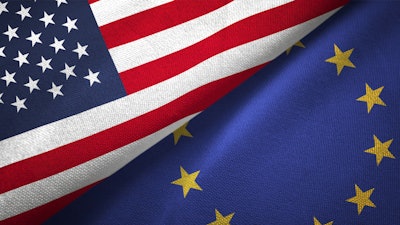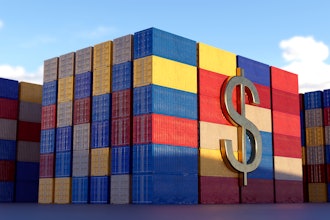
BRUSSELS (AP) — The European Union and the United States on Monday decided to temporarily suspend measures at the heart of a steel tariff dispute that is seen as one of the major trade issues dividing the two sides.
With the decision, “we are walking the talk in our efforts to reboot the trans-Atlantic relationship,” EU trade chief Valdis Dombrovskis said. It will affect anything from steel production to Kentucky bourbon sales.
On top of suspending the measures, both sides also said they are committed to talks “to address global steel and aluminum excess capacity.
"We are creating the space to resolve these issues before the end of the year,” Dombrovskis said.
It was the second palpable step to get back to better trade relations under President Joe Biden after both sides in March decided on a four-month suspension of tariffs used in the longstanding Airbus-Boeing dispute.
“As early as December 2020, the EU reached out to the Biden administration with a plan for a renewed EU-U.S. agenda, and we are pleased to see this approach bearing fruit,” Dombrovskis said.
The decision comes in time for the visit of Biden to EU headquarters in mid-June to discuss a new relationship after the bloc’s difficult relationship with his predecessor, Donald Trump.
The issue goes back to the 2018 tariffs that Trump slapped on EU steel and aluminum, which enraged European and other allies by calling their metals a threat to U.S. national security. The Article 232 proceeding both hurts European producers and has raised the cost of steel for American companies.
“The EU is not a national security threat to the U.S. But the distortions created by global excess capacity — driven largely by third parties — pose a serious threat to the market-oriented EU and U.S.,” Dombrovskis said.
Together, the EU and U.S. would be better positioned to deal with major steel producer China, which is seen as partly responsible for the glut.
When Trump imposed the tariffs, Europe retaliated by raising tariffs on U.S.-made motorcycles, bourbon, peanut butter and jeans, among other items.
The U.S. spirits industry was one of the first to react.
“This news couldn’t come soon enough. Distillers across the United States are breathing a huge sigh of relief after bracing for a 50% tariff on American whiskeys in just a matter of days," said Chris Swonger, president of the Distilled Spirits Council. He said any extension “would have forced many craft distillers out of the EU market,” one of the most lucrative markets in the world.






















